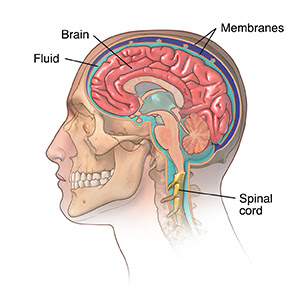Meningitis is a serious condition that involves inflammation of the protective membranes that surround the brain and spinal cord. This inflammation can be caused by viral, bacterial, or fungal infections.
The symptoms of meningitis can include:
Fever
Headache
Stiff neck
Nausea and vomiting
Sensitivity to light
Confusion or disorientation
Seizures
Rash (in some cases)
Meningitis is a medical emergency and requires prompt treatment, as it can be life-threatening if left untreated. Treatment for meningitis depends on the cause of the infection and may include antibiotics, antiviral medication, or antifungal medication. In some cases, hospitalization may be necessary.
Treatment for meningitis depends on the cause of the infection. Bacterial meningitis is typically treated with intravenous antibiotics, which are given directly into a vein through an IV line. Depending on the severity of the infection, treatment may be given in a hospital setting, where the person can be closely monitored.
Viral meningitis, on the other hand, usually goes away on its own without specific treatment. However, medications such as antiviral drugs may be given to treat specific viruses that cause meningitis, such as herpes or HIV.
Fungal meningitis is treated with antifungal medications, which can be given orally or intravenously.
In addition to these treatments, supportive care may be provided to help manage symptoms and reduce complications. This may include pain relief medications, fluids, and measures to reduce fever and prevent seizures.
There is currently no scientific evidence to support the use of homeopathic treatments for meningitis. Meningitis is a serious medical condition that requires prompt medical attention and appropriate treatment with antibiotics, antivirals or antifungals as needed, and supportive care to manage symptoms and prevent complications.
While some homeopathic remedies may claim to treat meningitis, there is no scientific evidence to support their effectiveness, and relying on these treatments instead of seeking medical attention can be dangerous and potentially life-threatening.
It's important to always seek medical attention from a licensed healthcare provider if you suspect that you or someone you know may have meningitis or any other serious medical condition.
There are standard medical treatments not available for meningitis in unani method of treatment, such as antibiotics, antivirals or antifungals, depending on the cause of the infection. These treatments are backed by scientific evidence and have been proven to be effective in managing meningitis.
It's important to seek medical attention right away if you suspect that you or someone you know may have meningitis, as prompt medical treatment is crucial to prevent serious complications and reduce the risk of long-term effects. A licensed healthcare provider can properly diagnose and treat meningitis and provide appropriate care and management of symptoms



No comments:
Post a Comment